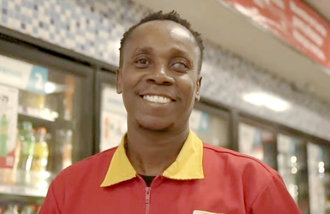Iranian Nobel Laureate Seeks to Vindicate Islam
Iranian Nobel Laureate Seeks to Vindicate Islam
Posted August. 10, 2009 08:21,
Before I start this interview, I need to check what happened in the 14 hours I was in flight.
Lawyer and human rights activist Shirin Ebadi, 62, the first Iranian and Muslim woman to win the Nobel Peace Prize in 2003, arrived in Seoul Saturday to accept the Manhae Peace Prize at the invitation of the Asia Journalist Association.
As soon as she arrived at her hotel, Ebadi sought a computer. She looked serious and nervous as she checked the political situation in Iran.
Many people are taking to the streets to protest the results of the Iranian presidential election. Nearly a million people staged demonstrations on the first day. After the government began attacking people, many died or suffered injuries and journalists, lawyers and professors were arrested, she said.
More than 2,000 people have been arrested in demonstrations in Iran since the June 12 election. Among them, 250 remain in custody and more than 30 have reportedly died due to the violent crackdown on demonstrators.
I dont take a political stance but I oppose the (Iranian) governments violent oppression, Ebadi said. Violence must be eradicated and all those who were arrested after the election must be freed. Compensation must also go to the families of protester victims, and another election must be held under U.N. oversight. Only then will Iran recover stability.
She said, however, that Irans political strife and Islamic culture that caused a woman wearing tight pants to be arrested on the charge of loose attire should not be misunderstood as a problem stemming from Islam or Islamic culture.
Of course, these are regrettable matters but not everything about Islam. Islam entails a diversity of interpretations, as evidenced by the fact that certain Islamic governments have had female prime ministers, she said.
Islam can also develop into a direction in which the religion stays in harmony with human rights. The problem is that undemocratic governments abuse the term Islam for an oppressive policy that defies human rights.
Ebadi was the first woman to become a judge in Iran. After being forced out of the job in the 1970s, she focused on human rights.
Her life has been in constant danger despite her winning the Nobel Peace Prize in 2003. Following the recent demonstrations in Iran, three of her colleagues were arrested and her husband was interrogated, she said.
Yesterday morning, Ebadi visited Cheonggye Stream in central Seoul and met Cardinal Nicholas Cheong Jin-suk. She then gave a lecture on inter-religion dialogue at Kyungdong Presbyterian Church and talked to Buddhist monks at Bongeun Temple in the afternoon.
yunjung@donga.com
Headline News
- Harris ‘first female president’ vs. Trump ‘again 2016’
- N. Korea builds 11-meter rampart after road demolition
- Democratic Party eventually agrees to abolish financial investment income tax
- Drug smuggling is seized twice a day on average this year
- Surrounded by ‘uniforms,’ NHL’s first female coach ‘time-out’







